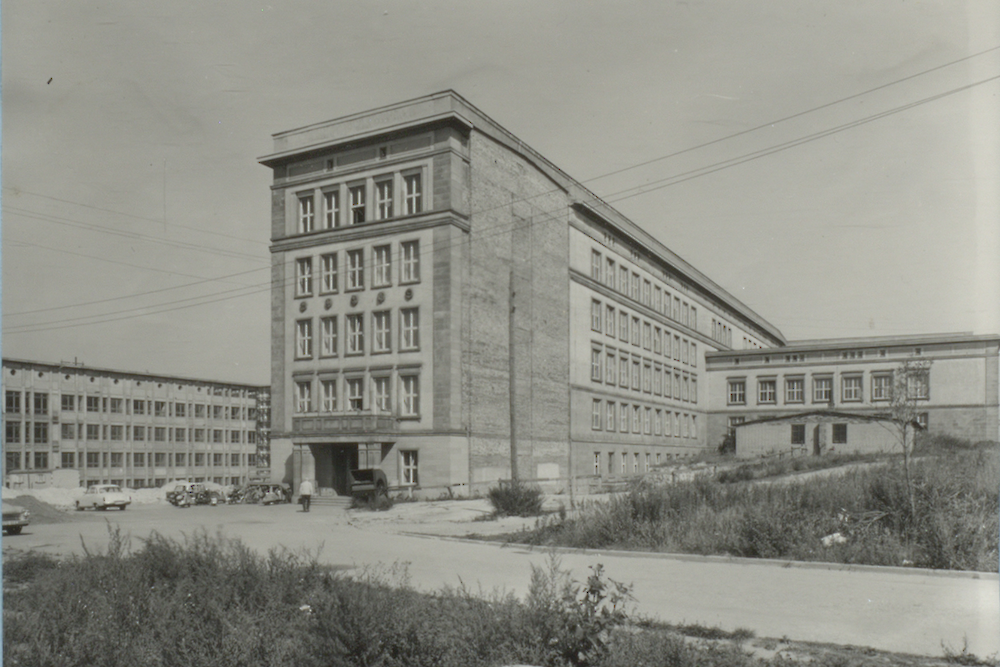Cutting-Edge Research Where Vineyards Once Grew

The first verifiable settlement was the former “State Nursing Home in Nietleben” in 1844. It was closed in 1935 and its buildings were integrated into the nearby army and air force communication school that had been built in 1934. Ultimately an army garrison was built along Heideallee.
During the GDR up to 9,000 Soviet soldiers were stationed on the Heide-Süd site. The area was enclosed by a wall and nearly hermetically sealed off from the outside world until the troops pulled out in 1991.
The western half of the site saw somewhat more activity. The Institute of Chemistry was built between 1952 and 1955 in what is now Kurt-Mothes-Strasse. More buildings were constructed in subsequent years, including the Institute of Pharmacy which was constructed between 1963 and 1965 in today’s Wolfgang-Langenbeck Strasse. Furthermore, 1974 saw the start of the construction of the University Hospital, which rose up in Ernst-Grube-Strasse. Originally designed to mainly treat the inhabitants of Halle-Neustadt, its ownership passed to MLU in 1979.
There was also growth from outside the university: in 1958 biochemist Kurt Mothes founded the Institute for Plant Biochemistry on behalf of the German Academy of Sciences of the GDR. After the fall of the Berlin wall it became the Leibniz Institute for Plant Biochemistry. In 1960 the Institute for Solid-State Physics and Electronmicroscopy was founded, also an institute of the GDR Academy of Sciences, which became the Max Plank Institute for Microstructure Physics in 1992.
Following the Reunification of Germany, plans were made to establish several new university research institutions on the site. In addition, non-university institutions were increasingly moving to the location, including one of the first institutions – the Fraunhofer Gesellschaft – in 1992; today the Fraunhofer Institute for Microstructure of Materials and Systems IMWS is located here.
The first Technology and Founders’ Centre was built in 1993. Just five years later the BioCentre was inaugurated that henceforth acted as an interface between applied research, development and production. That sparked off the settlement of many more research institute and companies. Together they make up the largest technology park in Central Germany, which is likewise the largest location for innovation in the region.
Further articles
“Flexibility is our advantage”
The Weinberg Campus is a high-tech location. In the last 25 years around one billion euros has been invested in a site that is also the heart of the university’s scientific campus. The density of research institutes is high on the nearly 134-hectare site. This is accompanied by numerous successful companies that have often emerged from start-ups. Important drivers of the process are technology and founders’ centres. The first one opened in 1993 and the technology park was born. Professor Reinhard Neubert - a scientist, Prorector and entrepreneur - is one of the pioneers of this development. He talks with Ines Godazgar in an interview. Read more
Halle’s Physicists on a Pathway to Success
Knowledge transfer is only successful when it is coupled with excellent basic research. The staff at the Institute of Physics are doing just that. The institute is not only home to three collaborative research centres (CRC) of the Deutsche Forschungsgemeinschaft (DFG, German Research Foundation) and one Alexander von Humboldt professorship. Its researchers have excellent international ties and have regularly attracted notice through articles published in renowned journals. Read more
Entrepreneurs perfect the solid-state battery
Employees at enspring GmbH on the Weinberg Campus are on the lookout for the ideal material for capacitors and lithium-ion batteries. They are able to take advantage of the excellent working environment and the university’s scientific expertise. Falk Lange, a PhD student at MLU and the founder of enspring, now also wants to gain a foothold in China. Hence, the story of enspring GmbH is also the story of basic researchers who have become business people active on the international stage. Read more
Anniversary at the Weinberg Campus: Images of the High-Tech Site
From a vineyard to a technology park: The Weinberg Campus unites the natural sciences of the University of Halle in one location. It is also home to the University Hospital and many renowned non-university research institutions. Numerous successful companies have also settled in the technology and founders’ centres. This year the campus is celebrating its 25th anniversary. Several image galleries provide an impression of the innovation location and its central buildings. Read more
